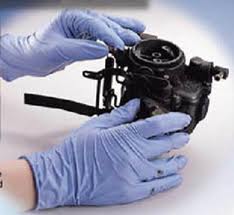There was a time when the only disposable gloves were the latex gloves you saw at your dentist or doctor's office. Well that's all changed. A few years ago nitrile gloves came on the scene aa a disposable glove for classic car mechanics. Now you see them everywhere... the factory, the airport, the lab... anywhere you want to protect yourself from the risk of contact with infectious, biological or hazardous materials.

Nitrile gloves are a synthetic that is very strong and durable and resist the harsh environment of most solvents, engine oils and grease, transmission fluids, brake fluids, and many other harsh chemicals a classic car mechanic comes in contact with daily. Latex gloves are the popular choice of dentists and physicians but many chemicals will dissolve them in just a minute or two and then, instead of protecting your skin, they trap chemicals against your skin. And non-disposable rubber gloves simply don't offer the feel you need for working with small bolts, screws, etc.
When you choose gloves, you will want to make sure you check for the mil thickness. Anything less than 5 mil thick will rip and tear easily and even 5 mil is marginal for prolonged use. 6 mil is a good compromise between excellent feel and tear-resistance and are probably the best choice for working on vehicles. And if you're in an environment where the chemicals run a good chance of contact further up your arm, there are gloves with 12 inch cuffs for more protection (in general, the 5 and 6 mil gloves will have a 9 inch cuff). You can go thicker for higher-risk applications (10 mil, 13 mil, or even 15 mil) but keep in mind that the thicker the material, the less feel you're going to have.
So if you are restoring, maintaining, or just tinkering, get yourself a good pair of disposable nitrile gloves to work with. You'll be glad you did.



